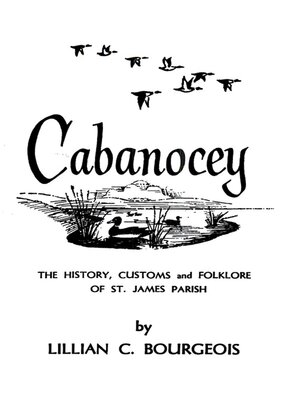Cabanocey
ebook ∣ The History, Customs and Folklore of St. James Parish · Parish Histories
By Lillian C. Bourgeois

Sign up to save your library
With an OverDrive account, you can save your favorite libraries for at-a-glance information about availability. Find out more about OverDrive accounts.
Find this title in Libby, the library reading app by OverDrive.



Search for a digital library with this title
Title found at these libraries:
| Loading... |
Louisiana has sixty-four parishes, and many of them are as individual and different as the state itself is different from others in the Union. St. James Parish, a small parish of 249 square miles, is not only one of the oldest settlements in the state, but it is different in its population make-up and is important historically.
Cabanocey . . . is a splendid history of the Parish of St. James. . . . Lillian C. Bourgeois captured the spirit that animates the population, which is descended from French, Spanish, Acadian, German, and Creole peoples. Bourgeois writes of the population's customs, beliefs, language differences, and folklore. Cabanocey is not a collection of dry facts and dates; rather, it vividly describes how, more than one hundred years ago, the people of St. James Parish lived, who they were, and what they contributed to their parish and their state. Before the Civil War, St. James Parish was the educational center of Louisiana, and Jefferson College was the first important college in the state. Founded in 1830, it had fine buildings, a well-equipped laboratory, and an impressive library. The Convent of the Sacred Heart (1835) for girls was well-known by prominent families in Louisiana, Mexico, and Central America, who sent their daughters there. Cabanocey contains St. James genealogies and thousands of names of early settlers, including the soldiers, taxpayers, officials, prominent families, and the first settlers and their children. From the early censuses and church and court records, descent is traced for many names. The censuses of 1766, 1769, and 1777 are complete and were obtained from the archives in Seville, Spain.






